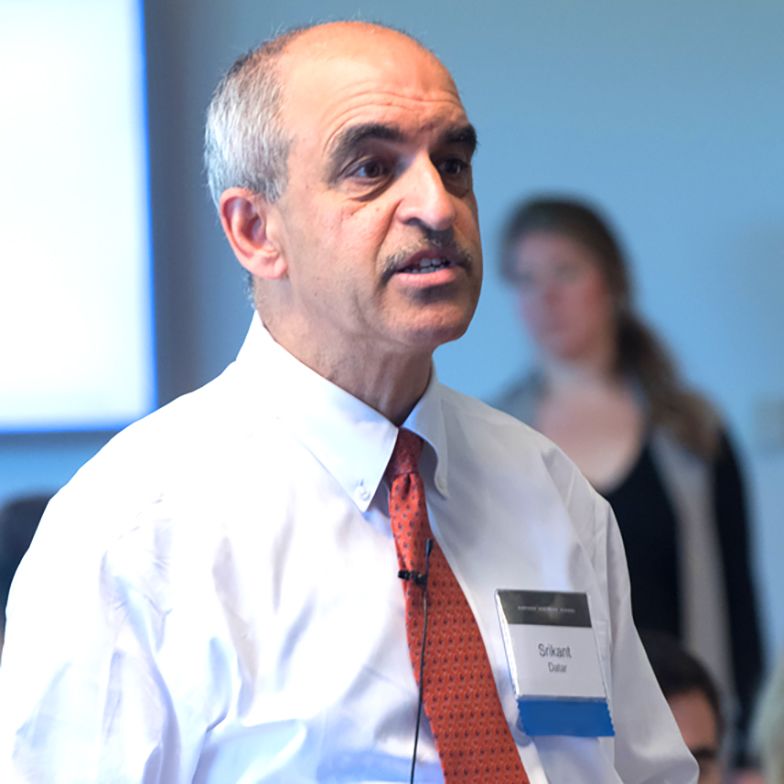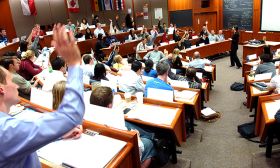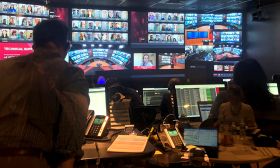Educational Innovation
The School quickly convened a task force from across campus. “Most of us didn’t know each other, but there wasn’t time for introductions,” laughs Datar, who led the group. The student experience was their top priority. “We needed to thoughtfully adapt our in-person teaching approach to provide an interactive and engaging experience online and incorporate the case method,” adds Datar, who is the Arthur Lowes Dickinson Professor of Business Administration and senior associate dean for university affairs.
A professor can stand in front of a physical classroom and see all of the students at once, explains Datar, but on Zoom, “you need to scroll through multiple pages to see someone sitting in the virtual equivalent of the sky deck.” Plus, students are naturally going to be more distractible online. “We needed to vary the pedagogy frequently to keep them engaged,” says Datar. Faculty members used polls before and during class to assess what students were thinking and build the discussion; breakout rooms so students could discuss issues in smaller groups; and the tried-and-true cold call.
“We needed to thoughtfully adapt our in-person teaching approach to provide an interactive and engaging experience online and incorporate the case method.”

“We needed to thoughtfully adapt our in-person teaching approach to provide an interactive and engaging experience online and incorporate the case method.”
Training faculty members was a big undertaking, as most of them had never taught online before. “HBS has the highest teaching standards. We don’t like to do anything that isn’t phenomenal,” explains Datar.
Fortunately, HBS had gained valuable experience and insights from co-developing the Harvard Business Analytics Program (HBAP), a certificate for executives launched in 2018. Ten HBAP faculty members served as trainers and mentors to their colleagues, with support from HBS’s Christensen Center for Teaching and Learning. “The School ran numerous training sessions and some 50 practice classes, created online materials and videos, and started a Slack channel where faculty could share tips and tricks,” says Willis Emmons, a senior lecturer and the center’s director.
A new role—online learning facilitator (OLF)—was created to support the faculty. Staff members from across HBS volunteered to take on the technical aspects of running classes so that faculty could focus on the students and the case discussions.
Sarah Descheneaux, an OLF who also works as a coordinator in the Finance Unit, explains, “We each partnered with a specific faculty member and class to host the Zoom platform, manage class participation, share documents and videos, set up and monitor breakout rooms, and troubleshoot technical issues.” She was paired with Carl Kester, the George Fisher Baker Jr. Professor of Business Administration. “We met for 30 to 40 minutes before each class to talk about what he was planning for that day and to practice using Zoom features. It ended up being a real partnership,” says Descheneaux.
“The generosity of our alumni...their commitment to our mission...made this possible. There’s no doubt in my mind that we couldn’t have done this without them.”
While Datar believes the School was able to deliver a strong educational experience online, he acknowledges that students and faculty alike missed "the energy and the connection of an in-person discussion...those intangible qualities that make the HBS classroom such a magical place.” He led additional work over the summer, based on extensive feedback, to further enhance teaching and learning.
The School is sharing what it learned with educators worldwide. “We documented all of our training and best practices on a Online Teaching Resources website from Harvard Business Publishing,” explains Datar.
Datar credits alumni with helping the School make the shift to online learning. “We at HBS are fortunate to have incredible resources that many other schools don’t,” he explains. “The generosity of our alumni…their commitment to our mission…made this possible. There’s no doubt in my mind that we couldn’t have done this without them.”


